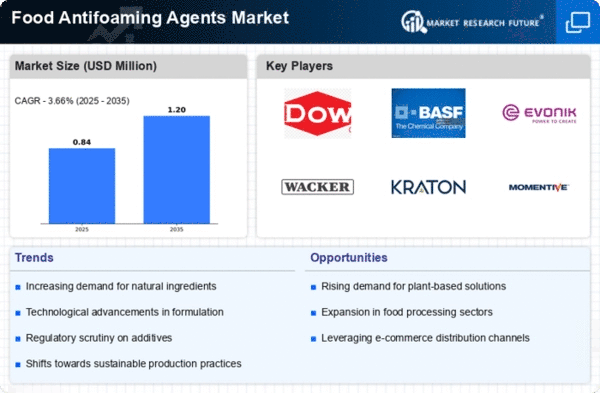Market Trends
Key Emerging Trends in the Food Antifoaming Agents Market
The food antifoaming agents market is experiencing notable trends that reflect the evolving landscape of the food and beverage industry, where managing foam and improving processing efficiency are critical aspects. Antifoaming agents, also known as defoamers, play a crucial role in preventing or reducing foam formation during food processing and manufacturing. One prominent trend in the food antifoaming agents market is the increasing demand for clean-label and natural ingredients. Consumers are becoming more discerning about the ingredients in their food, and the demand for antifoaming agents derived from natural sources is growing. This trend aligns with the broader movement towards clean-label products, prompting manufacturers to seek antifoaming solutions that meet clean-label criteria and address the rising consumer preference for transparency and natural ingredients.
Moreover, the food and beverage industry is witnessing a surge in the use of antifoaming agents in various applications, from dairy processing to brewing and frying. The demand for processed and convenience foods has led to increased foam-related challenges in manufacturing, requiring effective antifoaming solutions. In the dairy sector, antifoaming agents are used to control foam during processes like milk pasteurization and cheese production. Similarly, in brewing, antifoaming agents help prevent excessive foam formation during fermentation and packaging. The versatility of antifoaming agents in addressing foam-related issues across different food processing applications is a key driver for market growth.
Additionally, the global expansion of the food industry is influencing the food antifoaming agents market, with manufacturers catering to diverse regional preferences and regulatory requirements. As food production and processing become more globalized, antifoaming agents must comply with various food safety and regulatory standards. Manufacturers are adapting their formulations and products to meet regional specifications, ensuring that antifoaming agents are suitable for use in different food and beverage applications worldwide. This globalization trend highlights the need for versatile antifoaming solutions that can address diverse foam-related challenges across the global food industry.
Sustainability is emerging as a significant trend in the food antifoaming agents market, with consumers and manufacturers prioritizing environmentally friendly practices. Sustainable sourcing of raw materials, eco-friendly production processes, and the development of biodegradable antifoaming agents are becoming key considerations. This sustainability trend aligns with the broader industry movement towards responsible and ethical practices, emphasizing the importance of reducing the environmental impact of food production.
Furthermore, the market is witnessing innovation in antifoaming agent formulations to cater to specific industry needs. Manufacturers are exploring advanced technologies and novel ingredients to improve the effectiveness and versatility of antifoaming agents. Customized formulations for different food applications, such as low-foaming agents for sensitive processes or heat-stable agents for frying applications, are gaining attention. This innovation trend is driven by the need for antifoaming solutions that can address the evolving challenges and requirements of modern food processing.
The foodservice sector is also contributing to the growth of the food antifoaming agents market, with an increasing demand for solutions that improve the efficiency of commercial kitchens. Antifoaming agents play a crucial role in preventing excessive foam during cooking processes, such as frying and boiling, ensuring consistent and high-quality food preparation. The foodservice industry's emphasis on operational efficiency and consistent product quality is driving the adoption of antifoaming agents in various culinary applications.






Leave a Comment